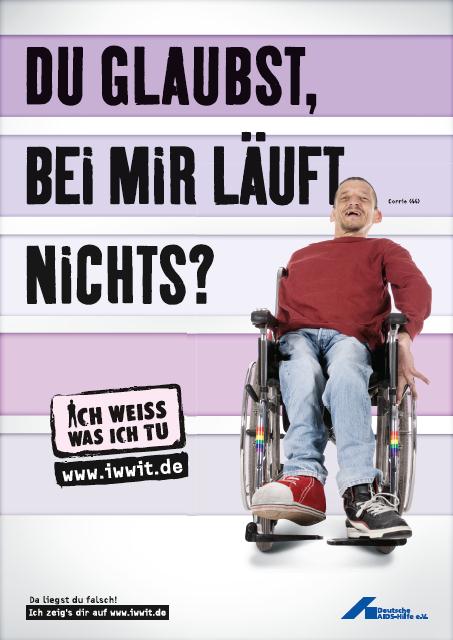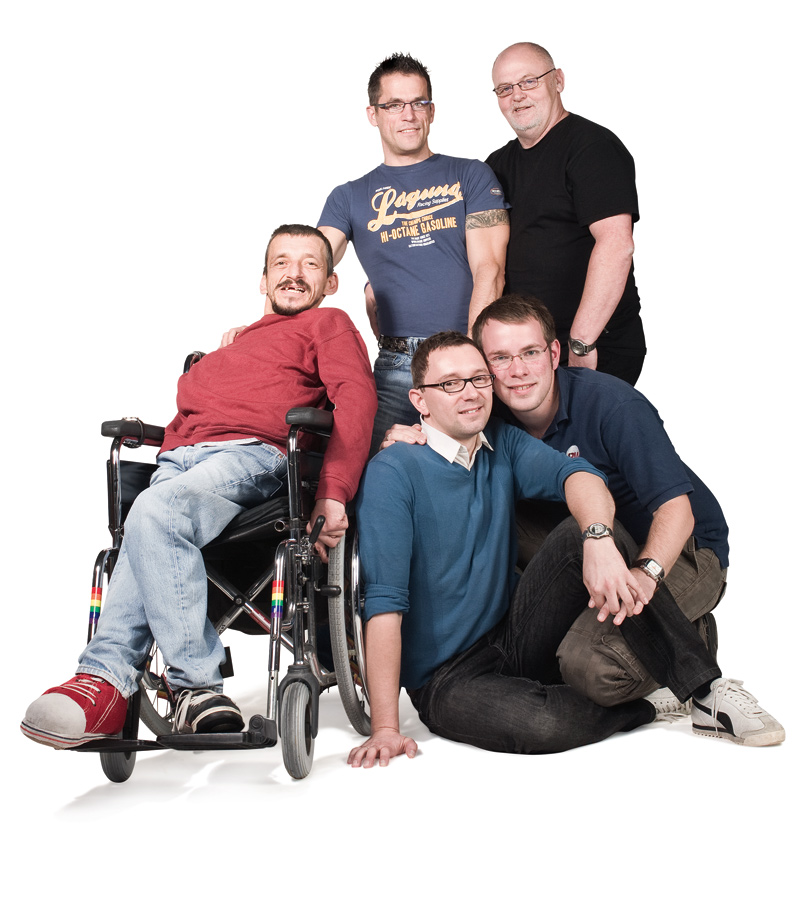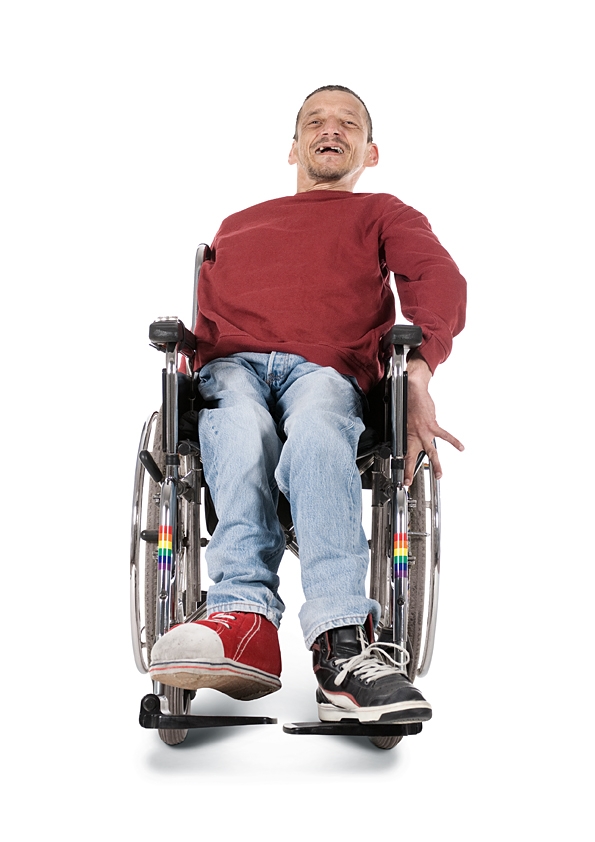Gay and then disabled - as if belonging to a minority wasn't enough. You have to find the strength to come out twice, maybe a third time if you also have HIV.

"As a disabled person, you won't get anyone anyway!" Corrie often used to hear. But then our I KNOW WHAT I'M DOING role model from Cologne got her first computer and started browsing gay chat and dating portals. "That really changed everything! I realised that I could also find sex there as a severely disabled person. Since then, I've been really happy with my sex life."
A 43-year-old wheelchair user from Braunschweig, who we'll call Michael here, has also had good experiences on the internet. "On Gayromeo, for example, you can find people who are explicitly interested in disabled people. It's more complicated in the scene."
48-year-old Tom from Bern has been disabled since birth and is also familiar with the problem of meeting other men. "Many people can't imagine wanting to have sex, let alone what sex with disabled people could be like."
The flirtation ends as soon as the disability is noticed
Those who prefer to live in reality encounter completely different difficulties, as Hans-Helmut Schulte knows. He is a psychological psychotherapist in Berlin and has been organising seminars for gay men with disabilities for almost 20 years. He knows from seminar participants: "They go into bars, take a seat, have their forearm crutches or wheelchairs folded up next to them. At some point, someone comes in and the flirting begins. But as soon as the other person notices the wheelchair, eye contact is quickly broken off."
His events are attended by blind and deaf people, visually impaired and hard of hearing people, as well as wheelchair users and people with invisible disabilities. People with HIV or AIDS, for example, who have such severe limitations that they are in a wheelchair. Conversely, it also happens that participants who have been coming to the meetings for a long time due to a physical disability one day also have HIV.

Despite many difficulties, Corrie wouldn't go so far as to call the gay scene hostile to people with disabilities. "When I'm out and about, I don't have any negative experiences. It's completely normal to look when you see someone with an obvious disability. I do that myself: oops, a disabled person!"
He himself says he is not interested in sex with disabled people, only with non-disabled people. But not everyone has that kind of self-confidence.
"I've noticed that other disabled people are quite prepared to have sex without a condom," says Corrie. "They probably do it because they're afraid they won't get any otherwise."
Sometimes people with disabilities specifically look for people who are in a similar situation to themselves, says Schulte, who used to run groups for disabled people in the gay counselling service. "Sometimes people call and want to know: What disability do the participants currently have? They were looking for someone with a similar disability to themselves."
Of course, not all disabilities are the same, but there are still a lot of clichés in circulation: wheelchair users can't get up, for example. This is true, but of course it doesn't apply to everyone. The causes and extent of disabilities are very different.
When do I say that I am disabled?
The big question that everyone has to deal with again and again in meeting situations is: When do I tell the other person that I am disabled? After all, someone who is deaf has a disability that is not obvious at first. "If you're already close to the sex situation, it might be too late, then the other person feels blindsided," says Schulte. "But you don't want to say it too early either - then you run the risk that the desired rapprochement won't even happen. You have to decide intuitively." It's called 'stigma management'.
Many people are very open about their disability in their flirt profiles. "If I were to write that I'm thin but I'm not, I'd have to admit that I was lying," says Tom. "However, I think fewer men contact me because of my disability. But the few that do are open-minded."
Maybe it's not the people themselves who are hostile to people with disabilities - many of the bars and clubs they run certainly are. Even in Berlin, as 18-year-old Tino, who has been confined to a wheelchair since a childhood infection, experiences time and again.
"I now know where I can get in and where I can't. But sometimes I want to try out a new pub or a new club with my friends and we turn back if it doesn't work."
Tom from Switzerland is also familiar with the problem and takes it with a sense of humour - at least most of the time. "Unfortunately, only two gay bars in Bern are wheelchair-accessible, and at one of them you have to get a key for the lift first. So you actually have to fly up the stairs and get the key first. Sometimes I just go home frustrated."
Michael from Braunschweig also experiences time and again that many shops are simply unavailable. But he usually finds someone to help him. "One to three steps work with help, and someone is always on hand. If you try, it often works, and sometimes it doesn't."
Schulte complains that it is often still too awkward for people with disabilities to go into bars. Here you might have to ring the bell, there you can only get in via the back entrance. "The fewer extra sausages there are, the better for the disabled."
Many obstacles for disabled people in the scene

Experience shows that things are still comparatively good in large cities. "But it's a different story in the countryside. There might be a gay party once in a while - it's relatively unlikely that you'll be able to get into this venue in a wheelchair."
Such experiences cause stress, as Hans-Hellmut Schulte knows from many stories. You long to live out your gay identity, but you don't succeed. Stressful experiences lurk for disabled people everywhere that others might not be able to imagine. People like to think: they are disabled, they have a lot of time on their hands.
In his seminars, he offers strategies for coping with stress, autogenic training, hypnotherapy and fantasy journeys. There is now also very practical help for people with disabilities who want to move around the city independently. With the smartphone app Wheelmap you can find out which underground stations in the city have lifts or where wheelchair-accessible restaurants, cafés and discos are located. In addition, many disabled people have friends who help them navigate the city and overcome obstacles. Toni, for example, only has friends without disabilities, while Tom also has some disabled people in his circle of friends. "With them, it's often the case that people talk and moan a lot about their disability. That's good too," he says with a grin. "But not always."









